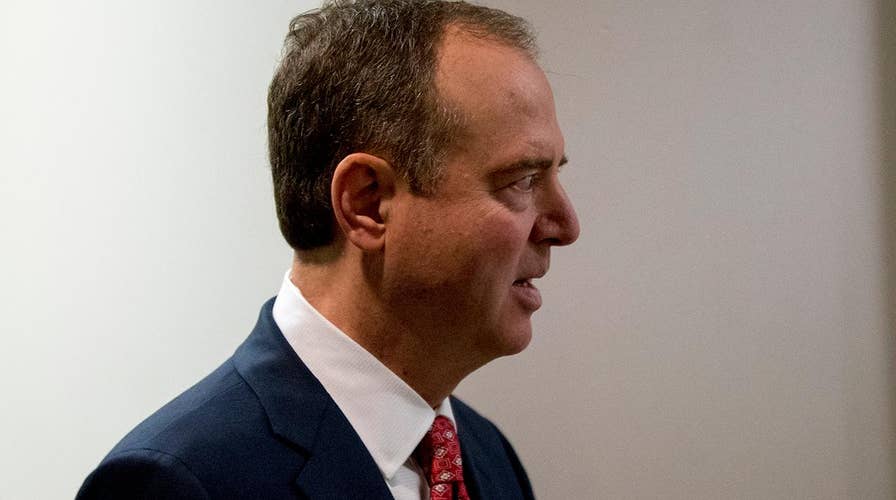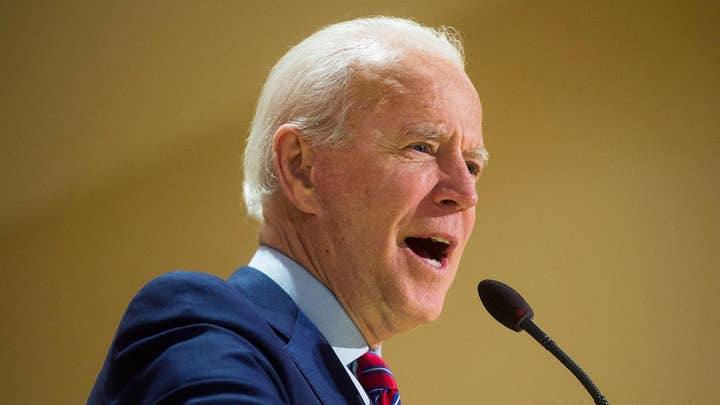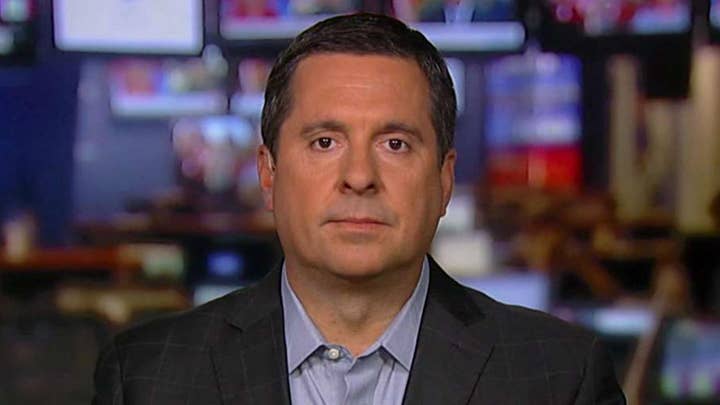Adam Schiff tries to stop Republicans from calling their witnesses
Democratic strategist Kevin Chavous and Republican strategist Lauren Claffey debate House Democrats' handling of the impeachment investigation.
House Intelligence Committee Chairman Adam Schiff set the stage for the first public hearings as part of the impeachment inquiry by vowing to keep questions at Wednesday's lead-off session focused on the Ukraine controversy -- in an implicit shot at Republican members who have signaled an interest in turning the tables on Democrats as they defend President Trump.
"It is important to underscore that the House’s impeachment inquiry, and the Committee, will not serve as venues for any Member to further the same sham investigations into the Bidens or into debunked conspiracies about 2016 U.S. election interference that President Trump pressed Ukraine to undertake for his personal political benefit," Schiff, D-Calif., wrote as part of a memo and letter to colleagues on procedures for the open hearings.
HUNTER BIDEN COULD BE COLLATERAL DAMAGE AS TRUMP IMPEACHMENT HEARINGS BEGIN
Notably, he cited rules for the investigation that would keep it focused on alleged attempts by the president to seek politically advantageous investigations from a foreign government, and whether he sought to cover it up.
The first hearings in the public phase of the impeachment inquiry will feature testimony from State Department official George Kent and top U.S. diplomat in Ukraine Bill Taylor on Wednesday. Later this week, former U.S. ambassador to Ukraine Marie Yovanovich will appear.
“The House’s inquiry into whether grounds exist for President Trump’s impeachment has been, and will continue to be, a sober and rigorous undertaking,” Schiff wrote to both Democrat and Republican members of the committee, vowing that the public hearings will adhere to House rules governing the impeachment process and that participants will be “treated fairly and with respect, mindful of the solemn and historic task before us.”
Schiff outlined some of the rules, including that members not assigned to the Intelligence Committee are not permitted to make statements or question witnesses, but are allowed to sit in the audience; there will be “equal time” for himself and Ranking Member Devin Nunes, R-Calif., to make opening statements; and there will be five-minute questioning segments for both parties.
The formal rules approved by the House last month also gave Republicans the ability to subpoena witnesses -- they sent over an extensive list of requested witnesses over the weekend.
But the Democratic majority has the final say. And while Schiff said they are reviewing the Republicans' list, his statements Tuesday signaled he would not be inclined to entertain witnesses or questioning that would shift focus to anything other than the allegations against Trump.
ICIG COMPLAINT ALLEGES TRUMP-UKRAINE WHISTLEBLOWER MAY BE SOLICITING ILLICIT DONATIONS
Republicans, though, have shown an interest in digging deeper into allegations against the Bidens, which is what prompted Trump's request to Ukraine in the first place -- eventually triggering the impeachment probe.
In Trump's now-famous July phone call, he pressed Ukrainian President Volodymyr Zelensky to launch investigations concerning Hunter Biden's role on a Ukrainian natural gas firm's board and Joe Biden's role ousting a prosecutor looking into that firm. This prompted a whistleblower complaint and, in turn, the impeachment inquiry in the House. The president’s request came after millions in U.S. military aid to Ukraine had been frozen, which Democrats and some witnesses have cited as a quid pro quo arrangement.
Over the weekend, Nunes, House Oversight Committee Ranking Member Jim Jordan, R-Ohio, and Foreign Affairs Committee Ranking Member Michael McCaul, R-Texas, listed Hunter Biden as one of numerous witnesses they'd like to call for hearings. They also sought former Democratic National Committee consultant Alexandra Chalupa in connection to allegations of Ukraine election meddling.
In his memo, Schiff stated that the committee is “evaluating the Minority’s requested witnesses and will give due consideration to witnesses within the scope of the impeachment inquiry.”
Schiff said that the parameters of the investigation include questions about whether Trump pressured Zelensky to investigate the Biden family’s business dealings in Ukraine for “personal political interests;” whether Trump withheld military aid to Ukraine to advance his own interests; and whether he and/or his administration sought to “obstruct, suppress or cover up information to conceal from the Congress and the American people.”
Schiff has already denied the Republicans’ proposal to have the whistleblower appear as a witness.
Meanwhile, on Monday, top Republicans on impeachment-related committees sent their own memo to fellow Republican members outlining their strategy.
Republicans said that the president had a “deep-seated, genuine and reasonable skepticism of Ukraine and U.S. taxpayer-funded foreign aid" due to the country's history of "pervasive corruption,” while claiming that Ukrainian government officials meddled in the 2016 presidential election in opposition to Trump.















































